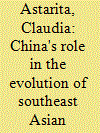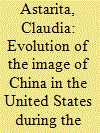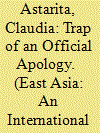| Srl | Item |
| 1 |
ID:
084820


|
|
|
| 2 |
ID:
092416


|
|
|
|
|
| Publication |
2009.
|
| Summary/Abstract |
This article describes the evolution of the image of China in the United States (US) during the Cold War. Aware that China-US bilateral relations have been influenced by periods of conflict and animosity, harmony and détente, the article argues that the image of China has always been embedded in a network of events-birth of the PRC (People's Republic of China [PRC], Korean War, Sino-Soviet alliance) that prevented American public opinion from developing an objective and unbiased picture of the PRC. Since 1950s, China has always been linked to the idea of the 'Yellow Peril'. Moreover, the lack of a direct contact between China and America further thwarted the opportunity of shaping a fair picture of the PRC. Although recognising that during the Cold War American political parties played a significant role in conveying a negative image of China, this article shows how media helped in strengthening Chinese stereotypes among the American public. Analysing all articles published by Time, National Geographic and Readers' Digest from 1949 to 1972, the article highlights both similarities and differences of the way in which these magazines introduced China to their readers.
|
|
|
|
|
|
|
|
|
|
|
|
|
|
|
|
| 3 |
ID:
171793


|
|
|
|
|
| Summary/Abstract |
More than 70 years after the end of the Second World War, warring nations have not completely achieved true reconciliation. For decades, official state-sanctioned apologies have been considered a useful tool to help rebuild broken international bonds, but their effectiveness in fostering national reconciliation remains debatable. On the contrary, more and more studies seem confirming civil society’s role in facilitating people’s reflection upon the most rending aspects of their own past. With civil society involvement in the discussion of Second World War responsibilities still limited in Japan, this paper recalls the experiences of Germany and Italy and the difficulties they encountered in shaping a constructive discussion on war responsibilities and reconciliation to argue that the Obama-Abe exchange of official visits in Hiroshima and Pearl Harbour in 2016 represents a crucial step forward in relaunching the debate on the Japanese Second World War narrative. In particular, this article claims that the wording and the images used by Shinzo Abe and Barack Obama could become, if well framed by national media and the official debate, “agitators of memory” pushing civil society to further and more deeply engage in this crucial discussion for the future of Japan.
|
|
|
|
|
|
|
|
|
|
|
|
|
|
|
|